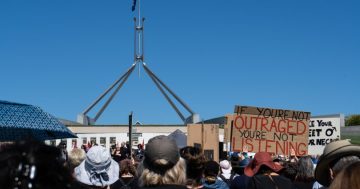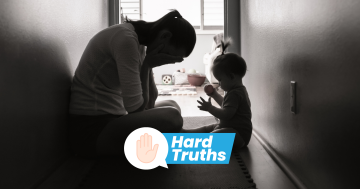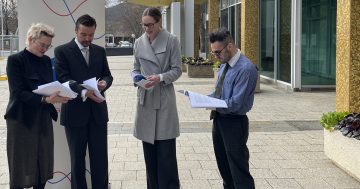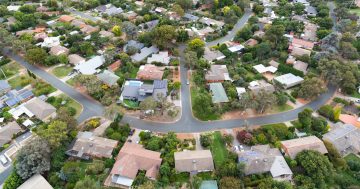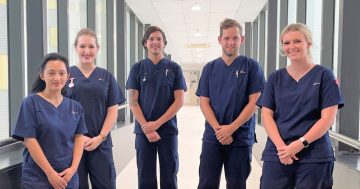
“I didn’t have a lawyer, because I couldn’t afford one … Legal Aid was means-tested, and because of the capital value I had in my property, I wasn’t eligible … If you sit in the middle, you’re on your own. Not that I was especially comfortable financially. It was a huge struggle to keep my home, and I would lie awake at night worried about how I was going to pay the bills and mortgage. I had a child for whom I was solely responsible …”
(Rosie Batty, A Mother’s Story, p.183)
Rosie Batty’s story is no different to the stories of many women in the ACT who have a left a domestic violence situation. Once they have left the violence, women (and men) in the ACT and their children are likely to experience significant income loss and financial hardship. This includes difficulty maintaining secure housing and accommodation, and large expenses associated with accessing and paying for legal support. Their finances may be tied up in property or family court proceedings. This impacts on their capacity to pay bills, repay loans, and to pay for the essential costs of daily living.
Even if they are employed full-time, earn good incomes, and have their own homes, they can struggle financially and be forced into poverty. Financial problems can emerge up to a year after someone has left an abusive relationship. Local Canberra research shows that 80-90% of local women seeking support for domestic violence experienced financial abuse, and 25% were left responsible for a debt accrued by their partner. Over half became homeless in the twelve months post-crisis.
Among those who have left domestic violence situations, Canberra has a missing middle – those between crisis and having re-established their lives, and between low-income safety nets and being able to afford services. To support this missing middle whose assets or income levels mean they are ineligible for government crisis assistance and support, we need broader local community support.
That is why the Women’s Centre for Health Matters and the Domestic Violence Crisis Service have been working with Deloitte, the Snow Foundation, and CARE Financial Counselling. Together, they have developed a local ACT response to the need for local women (and men) who have escaped domestic violence situations and stabilised their situation, but who have immediate financial needs, and whose ability to pay at that point in time is low.
A response has been designed, and its viability as a business model proven. A micro-finance facility will aim to close the gap for the missing middle.
The facility will offer one-off, no interest loans, primarily for providing some stability financially for a short term one-off need. A small number of one-off grants will also be considered. It is anticipated that the loan/grant could be used for, but not limited to:
- bond/rent payments;
- mortgage payments;
- school costs;
- medical expenses;
- utility payments;
- insurance payments;
- household goods;
- removalist costs;
- childcare costs; and
- and car costs (registration, licence, repairs etc).
People accessing the facility will also receive individualised financial counselling support through CARE Financial Counselling.
“From our work, we know that the majority of women leaving domestic violence in the ACT stay in their homes post crisis. Imagine finding the courage and making the difficult decision to end the violent relationship and then finding you can’t afford to pay your rental or mortgage payments or essential bills – even though you are on a reasonable income? Can you imagine having to decide whether it is better to face losing your home or not being able to pay your essential bills, or instead to resume the relationship with your violent partner because that is the ‘best’ available option?” says Marcia Williams, CEO of the Women’s Centre for Health Matters.
“Price Waterhouse Coopers recently calculated for us the approximate share of the cost of violence against women in the ACT,” Ms Williams said. “It amounted to $355.2 million in 2015 dollars – the ACT government cost burden could be as high as $127.8 million comprising health, administration and social welfare costs.”
“That is why, as a community, we need to invest in solutions for those women and men who have reached a period of stability and are rebuilding their lives post-crisis, women who have made it beyond crisis but now need a hand,” Ms Williams said.
The new micro-finance facility relies on local community donations for the initial corpus, and there are already pledges of support from the Snow Foundation, Deloitte, Ernst and Young, Price Waterhouse Coopers, KPMG, and Beyond Bank. Others in the property and banking sectors are also considering pledges.
Donations to support the program will be tax-deductible, and governance processes have been set up by a Steering Committee including CARE, SERVICE ONE, and Deloitte to ensure the financial integrity and sustainability of the facility. It is hoped that the facility will launch on 20 June and will be operational by July 1.
If you would like to know more or would be interested in contributing to the facility, please contact the Women’s Centre for Health Matters on 02 6290 2166.














